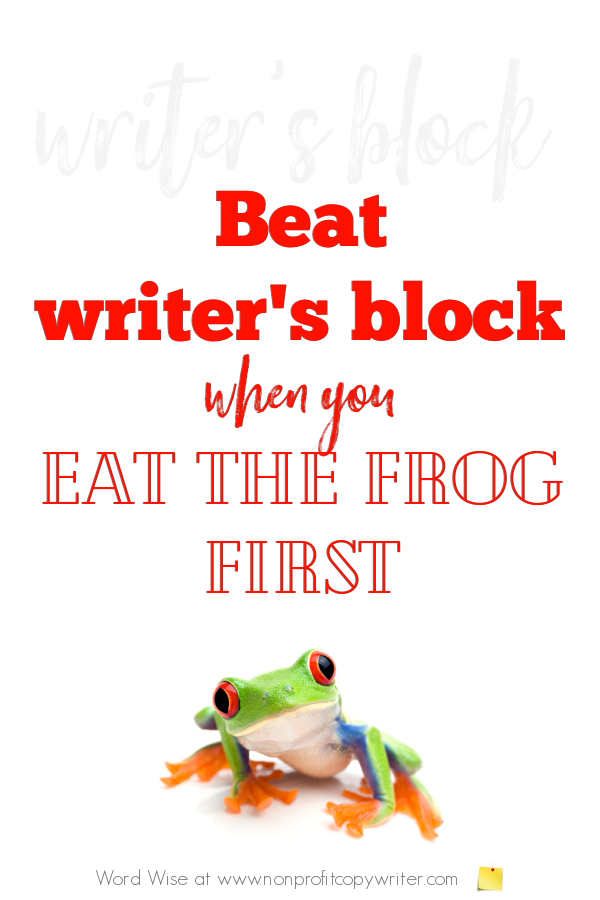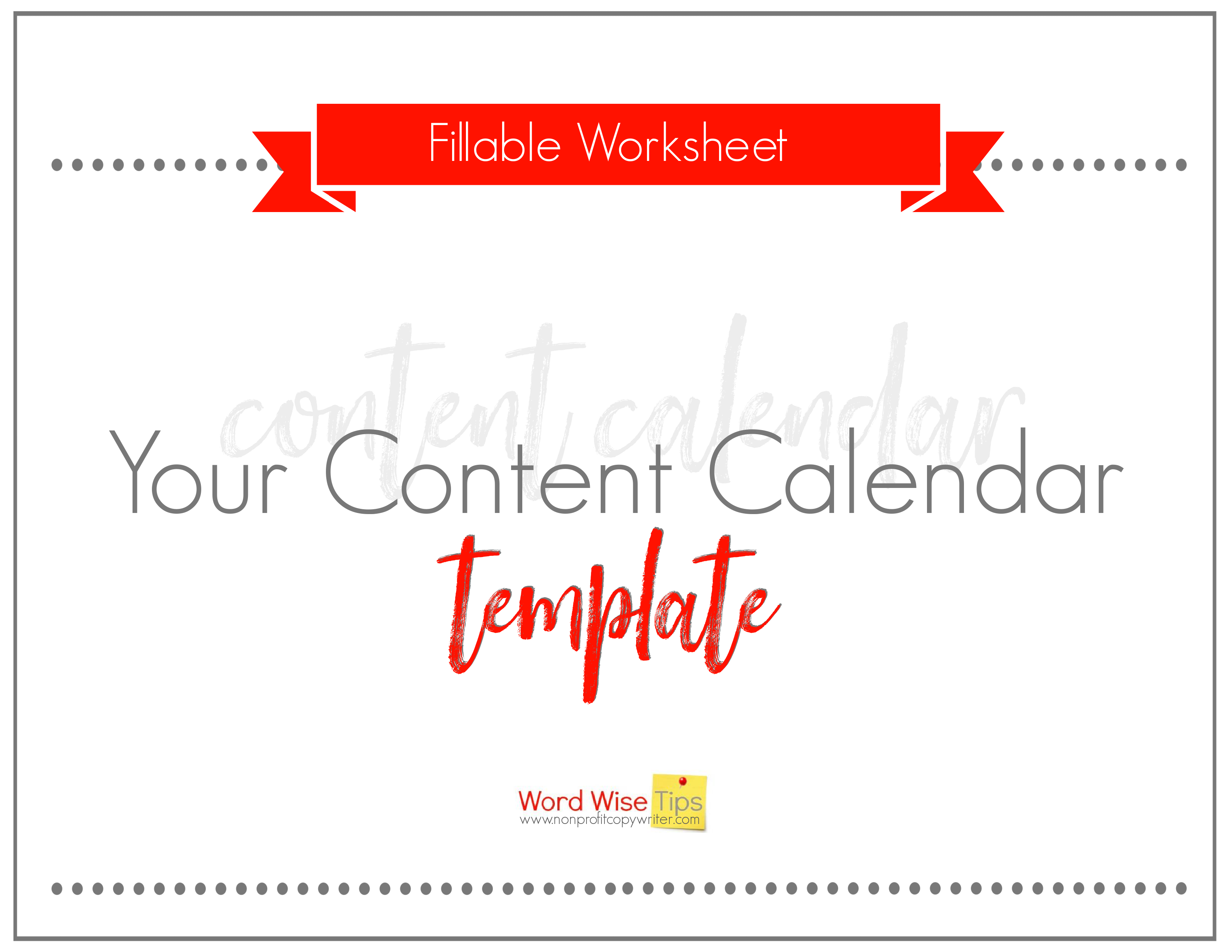Save Time: Get 5 Simple Writing Tips
you can put to use in 10 minutes
Beat Writer’s Block When You Eat the Frog First
Award-winning writer Kathy Widenhouse has helped hundreds of nonprofits and writers produce successful content , with 750K+ views for her writing tutorials. She is the author of 9 books. See more of Kathy’s content here.
Updated 12.9.25
“Eat the frog first!” The quip has become a rallying cry for productivity and self-improvement experts, made popular in the international bestseller Eat That Frog by Brian Tracy. But it’s also a powerful principle for writers, too.
The idea behind “eat the frog first” is to complete the one thing on your to-do list as your first task of the day. Most often, your frog is the task that you’re least motivated to do. Maybe it’s one step in marketing your book … writing the lead for a new article … tackling that grant application.
Whatever your “frog” is (more on that later), when you eat it first you’ll get that item completed rather than procrastinating about it. You’ll beat writer’s block and gain momentum. The rest of the day’s tasks will go more smoothly because the most dreaded one is behind you.
The “eat the frog first” principle is based upon a quotation credited to American writer Mark Twain (1835–1910). “If it’s your job to eat a live frog, it’s best to do it first thing in the morning,” Twain allegedly said. “And if it’s your job to eat two frogs, it’s best to eat the biggest one first.”

Who really offered the “eat the frog first” advice?
Somehow the quote was linked to Twain in the 1980s, a full 70 years after his death. But fact-checking website Quote Investigator did some digging. The truth is that French writer Nicolas Chamfort (1741–1794) is the quip’s likely originator.
“We should swallow a toad every morning,” Chamfort was quoted in 1795, likely referring to interacting with the aristocracy, “in order to fortify ourselves against the disgust of the rest of the day.” Chamfort regularly socialized with the upper class but supported the French Revolution.
Yet it was the Nobel laureate and French novelist Emile Zola (1840–1902) who took the quote’s principle and applied it to the writing life. “One thing above all is essential to a literary career …” he wrote in an 1896 Le Figaro column. “It is that you should learn to swallow a live frog every morning before sitting down to your daily task.”
Use this worksheet to create your own content calendar
and get more done.
What’s your frog?
Regardless of who gave the "eat the frog first" advice, the principle is immensely helpful for writers, particularly if you incorporate it as a habit. When you sit down to write — no matter what time of day — you attack the writing task that seems the most insurmountable or least appealing to you. Before you write anything else.
But there’s a catch. You need to know what your frog is.
If you don’t — or if you want a tool to clarify your most urgent daily task– give a nod to Dwight Eisenhower, the 34th president of the United States. “I have two kinds of problems, the urgent and the important,” said Ike as he shared his decision-making process in a 1954 address. “The urgent are not important, and the important are never urgent.”
That approach led to the Eisenhower Decision Principle (also called the Eisenhower Box or Eisenhower Method.) It’s a helpful tool in identifying your frogs. Look at your writing tasks for the day and classify them in one of four ways:
- Urgent and important: do it now
- Important, but not urgent: decide a time to do it
- Urgent, but not important: delegate it
- Neither urgent nor important: delete it
Your frog is the “urgent and important” task. This is the item you should do first when you begin writing. And naturally, as you conquer your frogs and complete additional tasks during the day, tomorrow’s frogs will be different.
Eat the frog example
Let’s look at an example. Say you are getting ready to write a book. You divide the project into tasks:
- Organize your ideas
- Research and gather additional information
- Write the content
- Format and publish your book
- Create a marketing plan and schedule appearances to talk about your book
Those are large tasks. You look at the mountain before you, and you get overwhelmed. So instead of getting started, you’re tempted to talk to your bookstore owner friend to schedule a book signing party. That would be fun. You’ll get to talk on the phone. Plus, you can stretch things and say that the phone gab is part of your “marketing plan.”
But there’s a problem. You haven’t even written your book yet. You don’t even have an outline.
Your first frog? Organizing your ideas into an outline. That’s the most urgent task you need to accomplish right now in order to make progress in writing your book. But to get going, you need to put your ideas on index cards.
So maybe today, your frog is to get started by putting your ideas on index cards. Then in subsequent days, your frog may be to organize your ideas into a rough outline. You’ll discover what parts of your book need more research. And your next big frog will be gathering additional information.
You can break that frog down into shorter tasks, too. And so on.
Today’s frog is your next most urgent task. It’s one that you tend to shy away from. But it’s also the one that can have the most positive impact on your writing project. You can take on other less-urgent tasks later in the day, of course, but you can see the power of eating the frog first.
Why eat the frog first thing in the morning?
“’Failure to execute,’ is one of the biggest problems in organizations today,” according to Brian Tracy. In other words, it’s not the lack of ability that holds so many people back. They can, in fact, execute. The problem is that they put off the important tasks until later, and many of those tasks never get done.
That’s why tackling your most distasteful or dreaded task first thing in the morning (or at the beginning of your writing session, no matter the time of day) prevents procrastination. When you eat the frog first thing, you create a snowball effect. You’re relieved and energized because the distasteful or biggest task is out of the way, so now you can reward yourself with more enticing options.
Maybe your frog is following up with a client lead. Or sending five prospecting letters. Or loading a blog post. Your frog will be unique to you. Whatever it is, eat that frog. Then you can get on to the fun stuff.
Eat the frog leg first
“Eating the frog first is too overwhelming!” If that’s you, there’s a simple solution. Just eat a frog leg — one part of the larger frog. And then tomorrow, eat another piece.
Soon, your first frog will be toast and you’ll move on to another frog. And you’ll make progress.
More Tips for The Writing Life
Maker Time vs. Manager Time For Freelance Writers ...
A Simple Content Calendar Template for Bloggers and Solopreneurs ...
The Shiny Object Syndrome for Writers ...
Don’t Finish Writing – and Get More Done ...
My Favorite Writing Productivity Hack: It’s Not about Writing At All ...
Beat Writer's Procrastination with a Simple Flip ...
Manage These 3 Big Distractions When You’re Writing At Home ...
Make Time to Write With These 15 Simple Tips ...
21 Ways to Beat Writer's Block ...
Quick Tip to Get Started Writing Strong Each Day ...
How To Write Faster: Use Bursts AND Binges ...
3 Tips for Starting Your Writing Project ...
7 Brainstorming Techniques for Writers ...
How to Set and Achieve a Writing Goal ...
Find Time to Write by Busting These 3 Myths ...
Do Writers Get Imposter Syndrome? Here’s What You Can Do About It ...
As an Amazon Associate I earn from qualifying purchases.
Share This Page

Named to 2022 Writer's Digest list
BEST GENRE/NICHE WRITING WEBSITE


Stop Wasting Time!
Grab your exclusive FREE guide, "5 Simple Writing Tips You Can Put to Use in 10 Minutes or Less"












